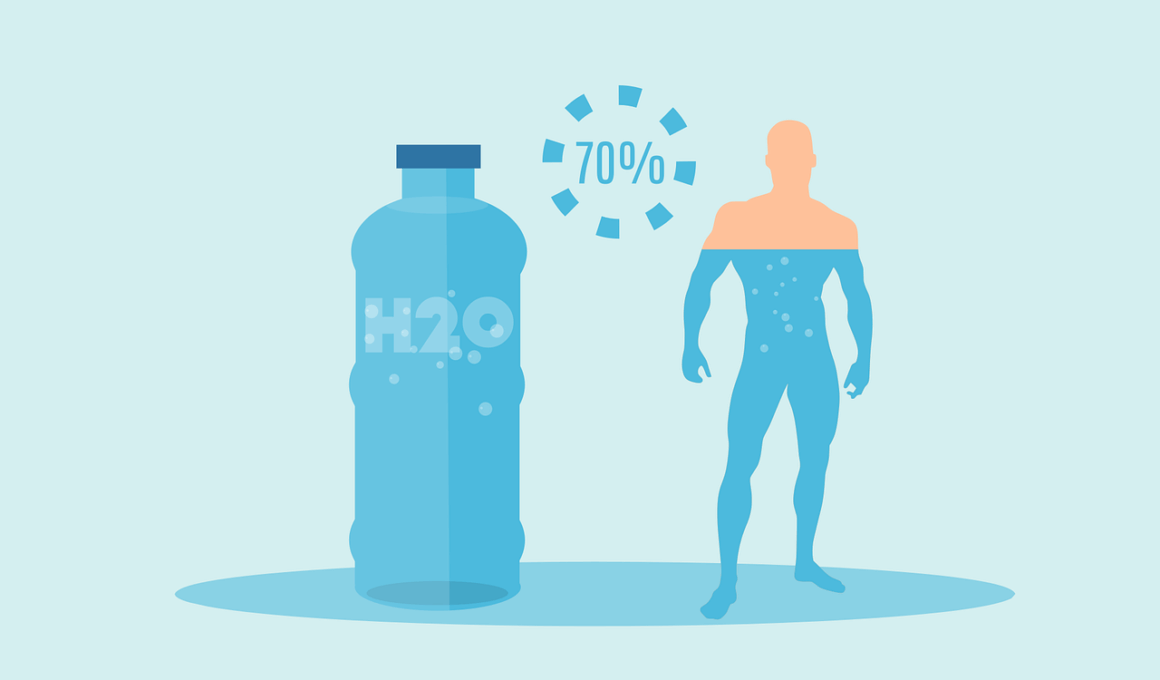The Effect of Electrolyte Imbalance on Mental Focus During Sports
Electrolytes, essential minerals within the human body, play a vital role in various physiological processes and are especially crucial during physical activities. When engaging in sports, adequate hydration and balanced electrolyte levels are necessary for optimal performance. Electrolytes, such as sodium, potassium, calcium, and magnesium, help regulate nerve function, muscle contractions, and fluid balance. Their importance cannot be overstated, as a deficiency or imbalance can lead to significant performance issues. For athletes, staying hydrated through proper electrolyte intake is key to maintaining focus and clarity. The depletion of these minerals can lead to fatigue, confusion, and impaired cognitive functions. For example, sodium is essential for maintaining blood pressure and fluid balance, while potassium plays a critical role in muscle contractions. As athletes sweat during exercise, they lose not only fluids but also electrolytes. Replenishing these minerals through sports drinks or electrolyte-rich foods is essential for maintaining concentration and overall performance. Therefore, understanding the effects of electrolyte levels on mental focus can greatly enhance athletic endurance and efficiency.
Understanding Electrolyte Imbalance
Electrolyte imbalances can occur due to various factors, including excessive sweating, inadequate dietary intake, or medical conditions. Knowing the symptoms linked to imbalances is essential for athletes to prevent performance declines. Common symptoms include headaches, dizziness, fatigue, muscle cramps, and confusion. When athletes experience these symptoms, their focus and mental clarity may be compromised. This is particularly detrimental during demanding sports activities where concentration is critical. Sodium, as a primary electrolyte, is lost in significant amounts through sweat. If these levels drop too low, athletes may suffer from hyponatremia, a condition characterized by low sodium levels, resulting in severe confusion, increased fatigue, and potentially life-threatening complications. Similarly, a drop in potassium, another vital electrolyte, can lead to muscle weakness, which directly affects performance. It is essential for athletes to monitor their body’s electrolyte levels and ensure they are adequately replenished post-exercise to avoid complications. Including foods rich in electrolytes, such as bananas, oranges, and various sports drinks, can help maintain the necessary balance for optimal physical and mental performance.
Furthermore, the relationship between hydration strategies and mental focus is a crucial area of research. During intense physical exertion, the brain requires sufficient hydration to function well. When electrolyte levels are low, dehydration can occur, leading to cognitive decline and diminished decision-making skills. Studies have shown that even mild dehydration can negatively impact concentration, alertness, and reaction time. Athletes must consume not only sufficient water but also electrolyte solutions designed to restore lost minerals quickly. Recent studies suggest that combining water intake with electrolytes can improve recovery after long-duration sports activities, significantly enhancing mental clarity. Proper hydration strategies should involve regular monitoring of body hydration levels, replenishment of electrolytes, and an understanding of individual hydration needs. Sports performance can greatly benefit from tailored hydration strategies that account for environmental conditions, intensity of physical activity, and individual sweat rates. Regularly assessing these factors and making necessary adjustments can lead to optimized mental focus and improved overall performance during sports, as attention and mental agility are crucial for success in competitive environments.
Role of Nutrition in Electrolyte Balance
Nutritional intake plays a pivotal role in regulating electrolyte levels within the body. Athletes often adjust their diets to include foods that are rich in necessary minerals to ensure they meet their electrolyte needs. Foods such as bananas, avocados, spinach, and coconut water provide natural sources of potassium, while dairy products are rich in calcium. This dietary approach can help athletes maintain the right levels of electrolytes, thus improving their mental focus during sports activities. Moreover, many sports drinks are specifically formulated to replace electrolytes lost during workouts. Consuming these beverages can provide rapid relief from sodium and potassium depletion. Furthermore, the right balance of macronutrients, including carbohydrates and proteins, supports overall athletic performance and energy levels. Understanding the appropriate timing of nutrient intake around workouts can significantly benefit hydration and balance, leading to sustained mental acuity. Nutritionists often suggest pre- and post-exercise meals that include electrolytes to ensure optimal hydration. This ensures that athletes are not only physically prepared but also mentally sharp, capable of performing at the highest levels during their sports engagements.
In addition to diet, monitoring hydration status before, during, and after exercise is crucial for maintaining optimal electrolyte levels. Regularly checking urine color, weight changes, and thirst levels can be effective methods to assess hydration. Pale yellow urine typically indicates adequate hydration, while dark yellow or amber signals dehydration. Being attentive to these signs can help athletes take timely actions before they encounter serious hydration issues. Weight loss during workouts can also inform electrolyte needs; losing more than two percent of body weight can increase the risk of significant dehydration. Therefore, athletes should make it a habit to weigh themselves before and after workouts. This enables them to devise adequate rehydration strategies and adjust their intake of fluids and electrolytes accordingly. It is important to replenish lost electrolytes not merely by drinking but also through consumption of nutritious foods. Finally, staying informed about individual hydration needs and adjusting intake based on specific conditions can significantly affect athletic performance, allowing athletes to maintain focus and clarity even during intense competitions.
The Impact of Temperature and Humidity
Environmental factors, such as temperature and humidity, play significant roles in electrolyte depletion and overall hydration needs. In hot and humid conditions, athletes perspire more, leading to a higher loss of fluids and electrolytes. Thus, both temperature and humidity levels must be considered when planning hydration strategies. Increased humidity can hinder sweat evaporation, leading to excessive sweating without effective cooling of the body. This situation can rapidly escalate dehydration levels, negatively affecting mental performance. Additionally, athletes should be aware of the signs of heat-related illnesses, as they may struggle to maintain focus under such conditions. Especially during hot weather, intake of fluids should be more frequent. Electrolyte drinks can proactively counteract the potential for both dehydration and imbalance. Athletes can optimize their performance by adapting their hydration strategies based on the climate. Finding the right balance between fluid intake and electrolyte replenishment during extreme weather conditions can be vital for success. Ultimately, understanding the influence of environmental factors can greatly enhance how athletes manage hydration and maintain mental clarity and focus throughout their sports activities.
Lastly, innovative technologies and applications are emerging to help athletes manage their hydration strategies effectively. These tools can monitor fluid loss, track electrolyte intake, and ensure athletes remain within their optimal hydration ranges during training and competitions. Through wearable technology and mobile applications, athletes can receive real-time feedback on their hydration levels, helping them make informed decisions. Such advancements not only enhance individual awareness but also provide tailored hydration plans based on performance data, environmental conditions, and personal physiological responses. Continuous advancements in sports science are promising for future improvements in athlete performance. Creating a proactive approach based on the individual needs of athletes can enable them to prevent issues related to dehydration and electrolyte imbalance. Consequently, better hydration management contributes to improved mental focus, allowing athletes to perform their best during competition. Such strategies represent the future of athlete health and performance optimization. Effectively integrating technology with nutrition and hydration protocols will define the next generation of successful athletic training regimens.





